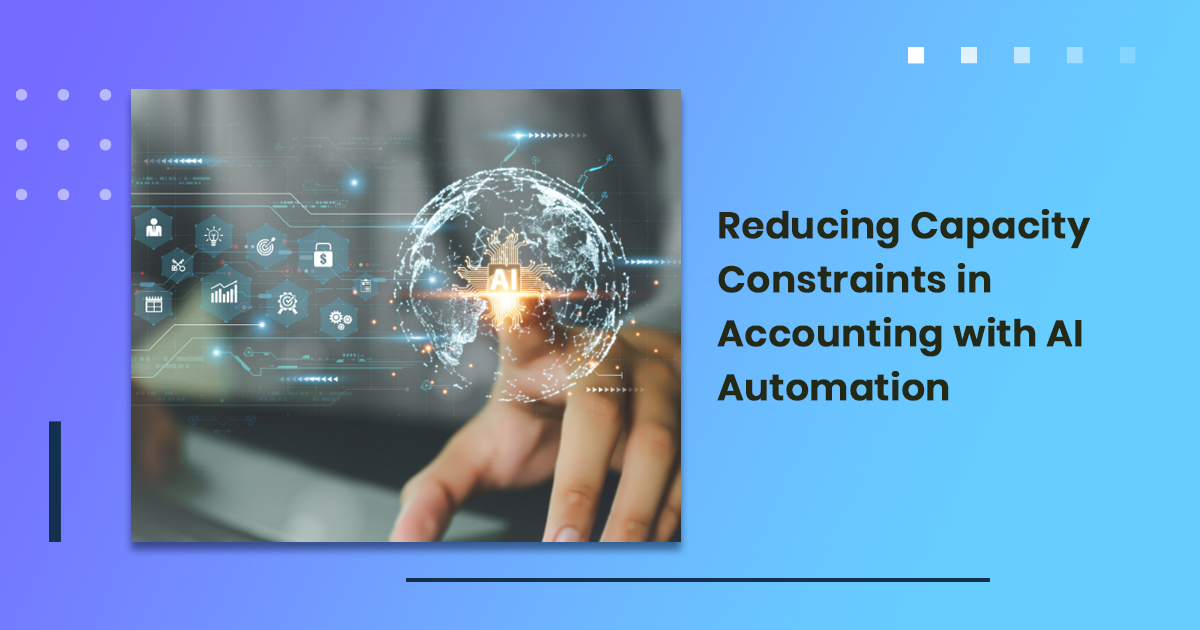
Reducing Capacity Constraints in Accounting with AI Automation
As the accounting industry evolves, many firms face the challenge of managing increasing workloads without expanding their workforce. These capacity constraints are especially prominent during peak periods such as month-end closings, tax season, and financial audits. In this changing landscape, AI-driven automation is revolutionizing how accounting firms operate, enabling them to scale more efficiently.
The widespread adoption of AI in accounting allows firms to eliminate repetitive manual tasks like invoicing, journal entries, and month-end reconciliations. In this article, we’ll explore how AI bookkeeping tools can help alleviate capacity constraints for accounting firms while boosting operational efficiency.
Recognizing Capacity Constraints in Accounting
Accounting firms frequently encounter capacity issues when they are required to complete many tasks within tight deadlines. This is particularly true during peak periods like tax season, financial reporting deadlines, and year-end closings. Tasks such as tax filings, payroll processing, and bookkeeping become overwhelming when firms rely on manual processes and limited staff, often leading to overtime, delayed reporting, and an increased risk of errors.
How AI Enhances Scalability in Accounting Operations
AI is proving to be a transformative tool in accounting, helping firms relieve the burden of capacity constraints. By automating time-consuming tasks, AI allows firms to remain efficient without needing to expand their workforce. Here’s how AI-driven automation helps firms scale their operations:
- Streamlining Month-End Closings: Month-end closings require extensive time and effort, including account reconciliations, reviewing large transactions, and ensuring financial accuracy. AI automates the matching of records and flags anomalies, reducing human involvement and speeding up the process.
- Automating Invoicing: AI takes over the creation, sending, and tracking of invoices. With pattern recognition, AI systems can predict potential delays and send automated reminders to clients, thereby improving cash flow and reducing the administrative workload.
- Simplifying Journal Entries and Categorization: Manually processing journal entries and categorizing transactions can be time-consuming and error-prone. AI tools analyze transaction data in real time, automatically categorizing expenses and income, minimizing mistakes and maintaining consistency.
Recent studies highlight the impact of AI on productivity. According to McKinsey, firms that embrace AI technologies experience a 20-30% productivity increase by automating routine tasks like invoicing and journal entries.
Key Benefits of AI-Driven Automation in Accounting
Beyond mitigating capacity constraints, AI-powered automation offers several important advantages for accounting firms:
- Minimized Errors: AI drastically reduces human error by automating data processing. AI tools analyze and handle vast amounts of data with precision, ensuring accurate financial reporting and compliance with regulatory standards.
- Data-Driven Decision Making: AI systems can analyze historical data to identify trends and patterns, providing valuable insights for better decision-making. Predicting cash flow trends, for example, can lead to more effective financial planning.
- Time Savings for Strategic Activities: Automation frees up valuable time for accountants, allowing them to focus on higher-value activities such as client advisory services and business development.
- Seamless Scalability: AI enables firms to scale their operations without adding staff. As workloads increase, AI systems can handle more tasks, allowing firms to expand their client base without worrying about administrative bottlenecks.
Will AI Replace Accountants?
While AI is revolutionizing the accounting profession, it is not designed to replace accountants. Instead, it enhances their capabilities. AI tools take over repetitive, low-value tasks, enabling accountants to focus on higher-value activities such as strategic planning, financial analysis, and client advisory work.
According to the World Economic Forum's Future of Jobs Report 2023, up to 85 million jobs may be displaced by AI by 2025, but more than 97 million new roles will emerge, particularly in areas such as data analysis, AI development, and financial consulting. For accountants, this means less time spent on manual tasks and more time dedicated to offering high-level services.
The Future of AI in Accounting
The future of accounting is set to be a hybrid model, where human expertise is augmented by AI-powered automation. As more firms adopt AI technologies, the accounting industry is expected to witness significant improvements in operational efficiency, accuracy, and scalability.
According to a report by Gartner, AI is projected to account for more than 50% of accounting tasks by 2026, including bookkeeping, payroll preparation, and tax filings. The potential benefits of AI are clear: increased efficiency, reduced costs, and faster, more accurate services for clients.
Conclusion
AI automation is transforming the accounting industry, offering powerful solutions for overcoming capacity challenges and achieving sustainable growth. Partners like Integra Balance AI are at the forefront of this revolution, helping firms navigate the complexities of AI-driven automation. By adopting AI, accounting firms can not only enhance their efficiency but also gain a competitive edge in an increasingly digital marketplace.
Schedule Your Free Demo
With our accounting automation experts
Find out how other practices have benefited using Integra Balance AI bookkeeping automation. 87% of practices who viewed AI bots in action have instantly discovered the advantages of using them at their firm.
Global Offices
US (Head Quarters)
Integra Global Solutions Corp
7500 Brooktree Road, Suite 100
Wexford (Pittsburgh)
PA 15090
+1 412 267 1529
Philippines
Integra Global Solutions Corp
Ayala Cebu Tower,
Cebu Business park, Cebu 6000
+1 412 267 1529
Europe
Integra Global Solutions UK Ltd
College House
17 King Edwards Road
Ruislip, London, UK, HA4 7AE
+44 (0)20 7993 2949
Canada
Integra Global Solutions Corp
32 Blencathra Hill, Unit 100, Markham
Ontario
+1 412 267 1529
India
Integra Global Solutions Corp
First floor, Kanapathy Towers,
Opp.BSNL exchange, Ganapathy,
Coimbatore – 641 006, India
+91 (0422) 437 9555
Australia
Integra Global Solutions Corp
+61 02 8005 1836
